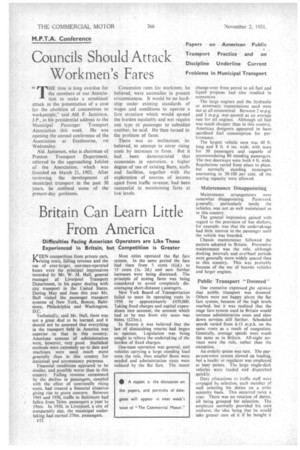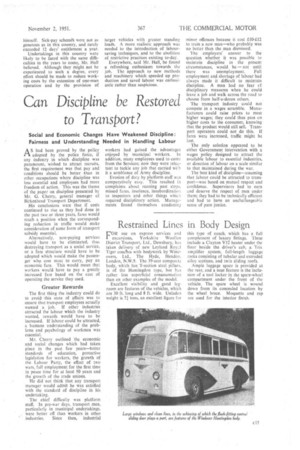Britain Can Learn Little From America
Page 50

Page 53

If you've noticed an error in this article please click here to report it so we can fix it.
Difficulties Facing American Operators are Like Those Experienced in Britain, but Competition is Greater
KEEN competition from private cars, rising costs, falling revenue and the use of ever-larger, one-man-operated buses were the principal impressions recorded by Mr. W. M. Hall, general manager of Liverpool Transport Department, in his paper dealing with city transport in the United States. During May and June this year Mr. Hall visited the passenger transport systems of New York, Boston, Baltimore. Philadelphia and Washington, D.C.
Technical:y, said Mr. Hall, there was not a great deal to be learned, and it should not be assumed that everythingin the transport field in America was superior to that in this country. American systems of administration were, however, very good. Statistical methods were extremely up to date and machines were used much more generally than in this country for statistical and accountancy purposes.
Financial conditions appeared to be similar, and possibly worse than in this country. Falling revenue occasioned by the decline in passengers, coupled with the effect of continually rising 'costs, had created a financial situation giving rise to grave concern. Between 1945 and 1950, traffic in Baltimore had fallen from 264m. passengers a year to 196m. In 1950, in Liverpool, a city of comparable size, the municipal undertaking had carried 370m. passengers.
c12
Most cities operated the flat fare system. In the same period the fare had risen from 5 cents (4:1d.) to 15 cents (Is. 2d.) and now further increases were being discussed. The principle of zoning fares was being considered to avoid completely discouraging short-distance t assengers.
New York Board of Transportation failed to meet its operating costs in 1950 by approximately £450,000. Taking fixed charges and capital expenditure into account, the amount which had to be met from city taxes was $64m. (£23m.).
In Boston it was believed that the law of diminishing returns had begun to operate. Legislation was being sought to relieve the undertaking of the burden of fixed charges.
One-man operation was general, and vehicles carrying a large standing load were the rule, thus smaller fleets were needed and administration costs were reduced by the flat fare. The recent change-over from petrol to oil fuel and liquidpropane had also resulted in economies.
The large engines and the hydraulic or automatic transmissions used were not at all economical. Between 2 m.p.g. and 3 m.p.g. was quoted as an average rate for oil engines. Although oil fuel was much cheaper than in this country. American designers appeared to have sacrificed fuel consumption for performance.
The largest vehicle seen was 40 ft. long and 8 ft. 6 ins, wide, with seats for 50 passengers and capable of accommodating 80 standing passengers. The two doorways were both -4 ft. wide. Regulations varied from place to place, but normally standing passengers amounting to 50-100 per cent, of the Seating capacity were allowed.
Maintenance Disappointing
Maintenance arrangements were
somewhat disappointing. Paintwork generally. particularly inside the vehicles, was not as well maintained as in this country.
The general impression gained with regard to the provision of bus shelters, for example, was that the undertakings had little interest in the passenger until the vehicle was boarded.
Chassis maintenance followed the pattern adopted in Britain. Preventive maintenance was the rule, although docking intervals and overhaul periods were generally more widely spaced than in this country. This was probably because of the use of heavier vehicles and larger engines.
Public Transport Doomed" One executive expressed Ihe opinion that public transport was doomed Others were not happy akin the flat fare system, because of the high levels reached, but it was realized that the stage fare system used in Britain would increase administration costs and slow down services still further. Scheduled speeds varied from (.1-13 m.p.h. on the same route as a result of congestion. Generally, average speeds were much the same as in Britain. All-night services were the rule, rather than the exception.
• An orderly queue was rare. The payas-you-enter system slowed up loading, but a loader or regulator was employed at busy points. The large single-deck vehicles were loaded and dispatched quickly.
Duty allocations to traffic staff were arranged by selection, each member of staff selecting his duties on a strict seniority basis.This occurred twice a year. There was no rotation of duties, all being grouped for• selection.The employee normally provided his, own uniform, the idea being that he would take greater care of it if he bought it himself. Sick-pay schemes were not as generous as in this country, and rarely exceeded 12 days' entitlement a year.
Undertakings in this country were likely to be faced with the same difficulties in the years to come, Mr. Hall believed. Although they might not be experienced to such a degree, every effort should be made to reduce working costs by the extension of one-man operation and by thc provision of larger vehicles with greater standing loads. A more realistic approach was needed to the introduction of laboursaving techniques, and to the abolition of restrictive 'practices existing to-day.
Everywhere, said Mr. Hall, he found a refreshing enthusiasm towards the job. The approach to new methods and machinery which speeded up production and saved labour was enthusiastic rather than Suspicious.




























































































